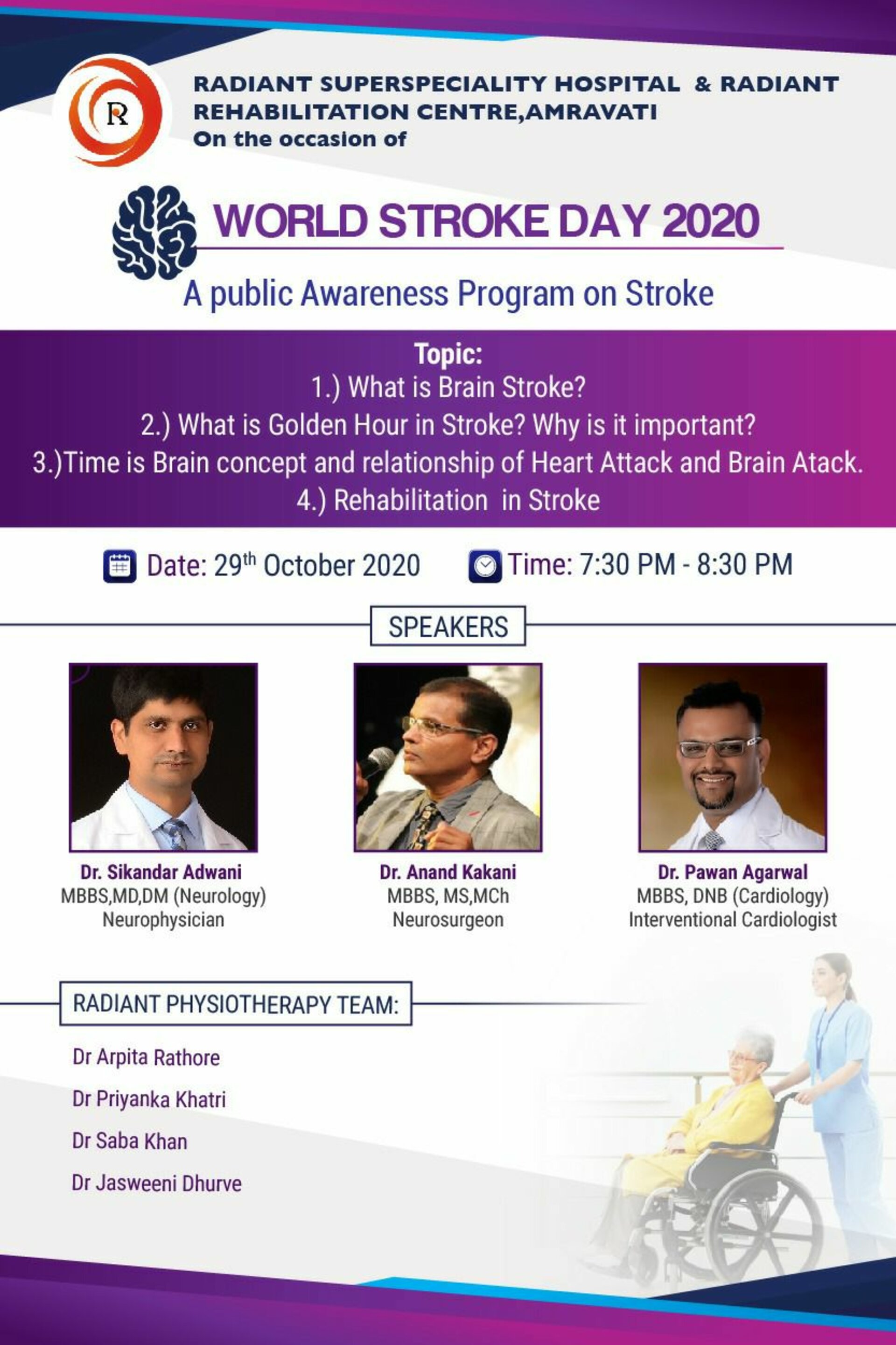On October 29th, 2020, we commemorate World Stroke Day with a special public awareness program focused on brain strokes. This crucial event aims to educate the public about the nature of strokes, their impact, and the importance of timely intervention and rehabilitation. Join us as we delve into this critical health issue with our esteemed speakers and physiotherapy team.
What is a Brain Stroke?
A brain stroke, often simply called a stroke, occurs when the blood supply to part of the brain is interrupted or reduced. This deprives brain tissue of oxygen and nutrients, causing brain cells to die within minutes. There are two main types of stroke:
1. Ischemic stroke: Caused by a blockage in an artery that supplies blood to the brain.
2. Hemorrhagic stroke: Caused by bleeding in or around the brain.
Understanding the nature of strokes is crucial for recognizing symptoms and seeking immediate medical attention.
The Golden Hour in Stroke: A Race Against Time
The term "Golden Hour" in stroke care refers to the critical first hour after stroke symptoms begin. This period is vital because:
- Brain cells start dying within minutes of oxygen deprivation.
- Quick treatment can minimize brain damage and potential complications.
- The effectiveness of certain treatments, like clot-busting drugs, is highest within this window.
Remember the acronym FAST to identify stroke symptoms:
- Face drooping
- Arm weakness
- Speech difficulty
- Time to call emergency services
Time is Brain: Every Minute Counts
The concept "Time is Brain" emphasizes the rapid loss of brain cells during a stroke. Research shows:
- In a typical stroke, 1.9 million neurons die every minute.
- 14 billion synapses are destroyed each minute.
- 7.5 miles (12 km) of myelinated fibers are lost every minute.
This rapid loss underscores the urgency of immediate medical intervention to minimize long-term damage and improve recovery prospects.
Heart Attack vs. Brain Attack: Understanding the Relationship
While a heart attack affects the heart, a "brain attack" (stroke) affects the brain. However, they share several similarities:
- Both are often caused by blockages in blood vessels.
- Risk factors overlap, including high blood pressure, high cholesterol, smoking, and obesity.
- Both require immediate medical attention.
- Prevention strategies are similar, focusing on a healthy lifestyle and managing risk factors.
Understanding this relationship can help in prevention and prompt recognition of symptoms for both conditions.
Rehabilitation in Stroke: The Road to Recovery
Stroke rehabilitation is a crucial part of recovery, aiming to help patients regain independence and improve their quality of life. It typically involves:
- Physical therapy to regain movement and strength
- Occupational therapy for daily living skills
- Speech therapy for language and swallowing difficulties
- Psychological support to cope with the emotional impact of stroke
Rehabilitation is tailored to each patient's needs and can continue for months or even years after the stroke.
Meet Our Expert Speakers
We are honored to have distinguished medical professionals sharing their expertise:
Dr. Sikandar Adwani: A renowned neurologist specializing in stroke care and prevention.
Dr. Anand Kakani: An expert in interventional neurology and advanced stroke treatments.
Dr. Pawan Agarwal: A specialist in neurorehabilitation and long-term stroke care.
Our Dedicated Physiotherapy Team
Our skilled physiotherapy team plays a crucial role in stroke rehabilitation:
Dr. Arpita Rathod: Specializes in early mobilization techniques for stroke patients.
Dr. Priyanka Khatri: Expert in neurological physiotherapy and gait training.
Dr. Saba Khan: Focuses on upper limb rehabilitation and fine motor skills recovery.
Dr. Jaswini Dhurbe: Specializes in balance and coordination therapy for stroke survivors.
Join us on October 29th, 2020, to learn more about stroke prevention, treatment, and recovery. Remember, awareness and quick action can save lives and improve outcomes for stroke survivors. Let's work together to combat stroke and promote brain health in our community.
